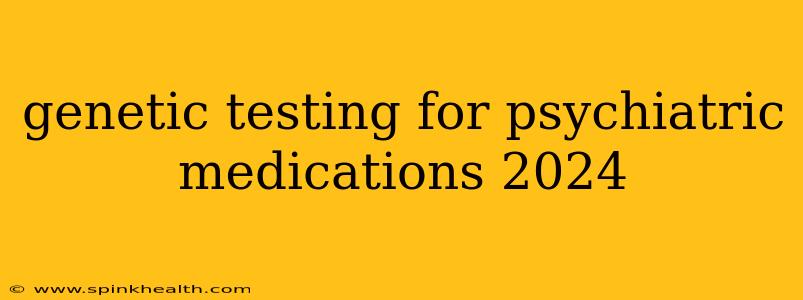Genetic Testing for Psychiatric Medications in 2024: A Personalized Approach to Mental Healthcare
The quest for effective mental healthcare is a deeply personal journey. For decades, finding the right psychiatric medication has often felt like a trial-and-error process, a frustrating game of chance with potentially significant side effects. But the landscape is changing. 2024 sees the continued rise of pharmacogenomics – the study of how genes affect a person's response to drugs – offering a glimmer of hope for a more personalized approach to psychiatric medication. This isn't a magic bullet, but it's a significant step forward in tailoring treatment to individual genetic profiles.
Imagine this: instead of weeks or months of trying different antidepressants with varying degrees of success (or failure), a simple genetic test could help predict which medication is most likely to be effective and have the fewest side effects for you. This is the promise of genetic testing for psychiatric medications.
What is pharmacogenomics and how does it apply to mental health?
Pharmacogenomics analyzes how your unique genetic makeup influences your body's response to medications. Think of it as a personalized instruction manual for your medication. We all metabolize drugs differently; some people break them down quickly, while others process them more slowly. These differences are often rooted in our genes. Genetic testing can identify specific genes involved in drug metabolism, helping doctors predict how you’ll react to various psychiatric medications. This personalized approach can help:
-
Increase the likelihood of finding an effective medication quicker: By identifying medications more likely to work for your specific genetic makeup, you can avoid the time and frustration of trying multiple medications that may not be effective.
-
Reduce the risk of adverse drug reactions: Knowing how your genes influence drug metabolism allows doctors to select medications with a lower probability of causing harmful side effects. This is crucial for psychiatric medications, some of which can have significant side effects.
-
Optimize medication dosage: Genetic information can guide doctors in determining the appropriate dosage, ensuring effectiveness while minimizing the risk of side effects.
What genes are typically tested for psychiatric medication response?
Several genes are commonly assessed in pharmacogenomic testing for psychiatric medications. These genes often play a role in how your body processes neurotransmitters like serotonin, dopamine, and norepinephrine—chemicals crucial to brain function and often targeted by psychiatric medications. These include, but aren't limited to, genes affecting the cytochrome P450 enzyme system (CYP enzymes), which are responsible for metabolizing many drugs. The specific genes tested can vary depending on the laboratory and the medications being considered.
Does genetic testing guarantee the perfect medication?
No, genetic testing is not a crystal ball. It is a valuable tool that increases the probability of finding an effective medication with fewer side effects, but it doesn't offer absolute certainty. Other factors, such as individual lifestyle, environment, and the complexity of mental health conditions, also influence treatment outcomes. Think of genetic testing as providing a more informed starting point in the treatment journey.
Is genetic testing for psychiatric medications covered by insurance?
Insurance coverage for pharmacogenomic testing varies widely depending on your provider and plan. Some insurance companies cover the testing, particularly if it is deemed medically necessary, while others may not. It's crucial to check with your insurance provider before undergoing testing to determine your coverage.
What are the limitations of genetic testing for psychiatric medications?
While promising, genetic testing for psychiatric medications has limitations:
-
Not all genes affecting drug response are known: Research into pharmacogenomics is ongoing; scientists are still discovering the complex interplay between genes and drug responses.
-
Test results are not always definitive: The results can provide probabilities, not guarantees, of effectiveness or side effects.
-
Cost: Genetic testing can be expensive, even with insurance coverage.
-
Ethical considerations: There are ethical implications surrounding the use of genetic information in healthcare. These must be carefully addressed to ensure responsible and equitable access to this technology.
How do I find a qualified healthcare provider to discuss genetic testing for psychiatric medications?
The best approach is to discuss your options with your psychiatrist or other mental health professional. They can assess your individual needs and help determine if genetic testing is appropriate for you. They can also guide you in finding qualified genetic testing services.
The future of mental healthcare is undoubtedly leaning towards a more personalized approach, and pharmacogenomics is playing a central role. While not a panacea, genetic testing offers a valuable tool in the ongoing quest for more effective and safer treatment of mental health conditions. As research progresses and testing becomes more widely available and affordable, we can expect even greater advancements in the personalized treatment of mental illness.

